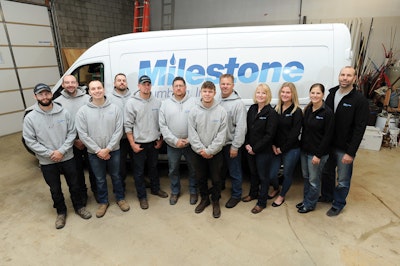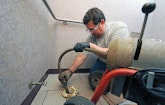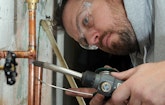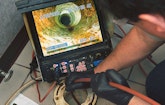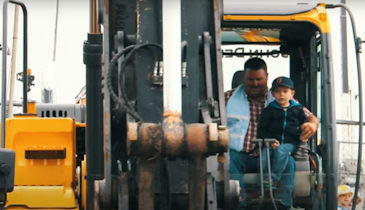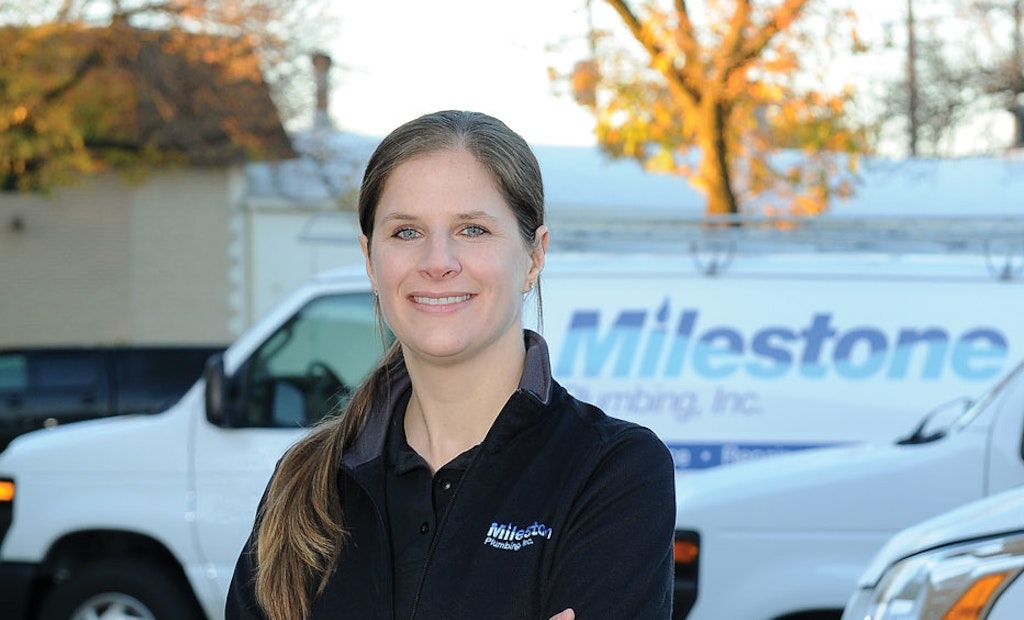
Master Plumber Jessie Cannizzaro, owner of Milestone Plumbing, started her plumbing business in 2011 in the basement and garage of her house.
Interested in Business?
Get Business articles, news and videos right in your inbox! Sign up now.
Business + Get AlertsJessie Cannizzaro is an outlier in the plumbing world. First, she’s a woman in a heavily male-dominated trade. In addition, she’s technically a businesswoman first and a plumber second.
Cannizzaro earned an undergraduate degree in business and a Master of Business Administration before she ever wielded a monkey wrench professionally.
Moreover, the co-owner of Milestone Plumbing in suburban Milwaukee, is also an instructor in a plumbing-apprenticeship program offered at a local community college, where she’s quietly spreading a message to young would-be plumbers: Four-year college degrees aren’t the only ticket to successful careers.
Initially, Cannizzaro — the daughter of retired plumber Tom Cannizzaro — harbored zero aspirations to join the trade she now embraces so enthusiastically. And for someone who spent most of her life with no desire to follow in her father’s footsteps, Cannizzaro has done well — and does it her own way.
Since she established Milestone Plumbing in 2011 in the basement and garage of her home in Wauwatosa, the company — which she co-owns with her husband, Adam Curtis — has grown to 12 employees and eight service vehicles. Furthermore, gross income rose approximately 55 percent from 2014 to 2017. And in an everything-comes-full-circle moment in 2013, she moved the business, which focuses on service and repairs and some remodeling projects, into the location once used by her father’s company.
Personal victory
Cannizzaro’s success story underscores the value of a business-minded approach to plumbing, especially when combined with an emphasis on customer satisfaction and investments in productivity-enhancing equipment and vehicles. It also reflects a personal victory of sorts — a rebuttal to everyone who ever told her a woman can’t be a plumber. And that surprisingly enough included her father, she says.
“I love to do what people say can’t be done,” says Cannizzaro, a master plumber, explaining her motivation. “Even my dad told me the world isn’t ready for a woman plumber. I think he did it more to protect me because people can be very harsh and cruel.
“But he’s very proud of me, even though he fought me on it and told me I was making a big mistake,” she continues. “Now he proudly wears Milestone T-shirts and a Milestone wool winter hat.”
Cannizzaro says many people ask her why she didn’t just take over her father’s business. The answer lies in a dynamic that’s probably familiar to many children that work in family-run businesses: Differing business philosophies. “We didn’t see eye to eye about certain things, so it quickly became apparent that if I wanted to build a business, I’d have to start from scratch,” Cannizzaro says. “I wanted to be more than just a one-man-with-a-van business.”
Early exposure
As one would expect, Cannizzaro got her first taste of plumbing as a child. As she puts it, she grew up around plumbing, but wasn’t at all interested in it. “On some days, I had no choice — I was told, ‘You’re going with Dad today,’” she recalls. “And if it was a pretty big project and I did a good job, he’d take me to Toys R Us and let me pick out a Nintendo game as a reward. I didn’t see the value of it (as a career) until I was much older.”
Things changed when Cannizzaro was about 22 years old. While she was attending the University of Wisconsin-Milwaukee for her undergraduate degree and working full time for a local restaurant, her father suffered a stroke.
“I stopped working to help him out while still going to school,” she says. “I worked for a full year before I realized I truly enjoyed it — that I wasn’t just doing it to give him a hand. So I started my apprenticeship with him and moved to another company during my second year, where I finished my apprenticeship.”
While attending University of Wisconsin-Milwaukee to earn her MBA (which she received in 2008), Cannizzaro got the itch to run her own business. So she wrote up a business plan during 2009 and 2010, then established Milestone Plumbing in 2011. She received financial assistance from the Wisconsin Women’s Business Initiative Corp., a microlender for entrepreneurs who can’t qualify for traditional business loans from banks, she says.
To write the business plan, she took advantage of local free resources, such as the Entrepreneurial Training Program offered by the Wisconsin Small Business Development Center at University of Wisconsin-Milwaukee.
How valuable have the business degrees been to her business? While noting they’re not a necessity to run a plumbing outfit, Cannizzaro says they’ve helped her approach the business with a different mindset than some plumbers.
“When I meet with a consultant or an accountant and they tell me they want me to do something a certain way, I understand why,” she explains. “For example, job costing is a very tedious process, but I see how valuable it is because small mistakes over the course of, say, five years can result in losing a significant amount of money.
“So figuring out what our actual costs are versus what we quoted for a remodeling project, for example, can be a great learning experience for quoting the next job,” she adds. “That’s often the difference between finishing in the red or in the black.”
Putting customers first
Providing great service for customers also plays a key role in the company’s success. Some of it is very elementary: showing up on time and calling customers back when they leave messages. Technicians wear shoe covers, use tarps and leave job sites cleaner than when they arrived. “I tell our guys that if they see Cheerios under the toe kick when you leave the space, pick them up,” she says.
But customer service also comes in other forms, such as investing in good vehicles and equipment. Milestone Plumbing owns eight service vehicles: a Chevrolet Express 1500 van, two Ford E-250 Econoline vans and five newer Ford Transits.
Cannizzaro says the company switched to Transits because they offer more headroom for technicians, as well as items such as water heaters, which can be stowed upright. That leaves extra floor space for important items such as drain cleaning machines that otherwise might have to be left behind, requiring a trip back to the shop if they’re needed on short notice. That extra trip, in turn, provides a lower level of customer service, she says.
The Transits are outfitted with Masterack storage systems installed by Ultimate Truck & Car Accessories. All the trucks feature similar rack configurations so technicians can easily work efficiently out of any truck if necessary. The Transits also include a convenient four-drawer unit from American Van Equipment that’s installed across the cargo area, behind the cockpit bulkhead. They provide extra storage space that’s compact and easy to access; technicians just open the side sliding door and pull out the long drawers, Cannizzaro says.
Technicians generally use Milwaukee Tool hand and power tools, along with some made by RIDGID. Other pieces of equipment include one RIDGID SeeSnake pipeline inspection camera; four ladder racks made by Topper Mfg.; electronic deadbolt systems made by Cargolock; two K-1500 drain machines, seven K-45 drum machines and two K-50 drain machines, all made by RIDGID; three RIDGID pipe-threading machines; a Makita U.S.A. HM1810 concrete breaker; a K300 Husqvarna Construction Products concrete wet-saw; and a Milwaukee Tool SDS-Max demolition hammer.
Hiring as a team
Success also requires building a good team of employees. “This is a very team-oriented company,” Cannizzaro says. “We wouldn’t be where we are without being team-oriented and without great employees.” As such, hiring people who will thrive in a team environment is critical.
To accomplish this, Cannizzaro uses an unconventional group approach to interviewing job candidates. “I learned from a business consultant that group interviews allow you to see different things, like how applicants interact with their fellow applicants,” she explains. “It helps us spot people who want to work and will go the extra mile for our customers, as well as understand our values.”
Here’s how it works: After narrowing applicants down to a reasonably sized group, Cannizzaro, Curtis, Penny Cox (general manager), Kevin Poppie (service manager) and Alex Roloff (first-year apprentice) participate in about a one-hour-long presentation about the company and its values, culture and mission. “The whole team takes part in the process so that one person doesn’t do all the talking,” Cannizzaro says.
Then the candidates must participate in a group discussion. The topic is a magazine article the candidates receive ahead of time; it talks about business values and going the extra mile for customers.
“We ask them questions about the article and talk about the three big takeaways in it,” she explains. “It breaks the traditional one-on-one interview process — gives us a snapshot of who this person is and whether they’ll work well as a team. Maybe they have an attitude and don’t play well with others. Or maybe they didn’t read the article and are totally unprepared.”
Candidates aren’t told any of the details about the interview, just that they must attend a “company introduction.” Why no advance notice? “They have to be able to handle pressure,” Cannizzaro says. “They’re going to have to keep cool when something goes wrong and a homeowner is right there. Some people say what we do is mean, but I say it’s just (simulating) the real world.”
Along for the ride
After the group presentation/interview, which typically takes anywhere from one to 1 1/2 hours, the candidates do individual, two- to four-hour ride-alongs with veteran technicians who later provide the management team with feedback. “It’s a big commitment for us (to hire someone) because we pay for their apprenticeships,” she says, explaining the reason for the intense interview process. “They have to serve one year as a pre-apprentice, and if they do a good job, they get to go into the five-year apprenticeship program.”
There’s one final step: After the management team compares notes, they pick the finalists, who later attend individual interviews — this time just with Cannizzaro and Cox.
The group interviews offer another advantage in that they save time; it’s quicker to interview, say, seven people in a group setting than to do seven individual interviews. Are the results any better than a traditional interview process? If they are, they’re hard to quantify, Cannizzaro reports.
“But what I do know is that they understand how serious the opportunity is,” she says. “And sometimes applicants who get turned away will reapply or applicants will send us a card or an email telling us that they really want the job. While I can’t quantify it, we believe this system creates stronger buy-in. They realize they’re buying into a career, not just a job.”
Cannizzaro also points out that Milestone Plumbing enjoys low employee turnover; out of four apprentices, none have left the company. She also strives to promote from within. A good example is Poppie, a journeyman plumber whom she recently promoted to service manager. Ironically, Poppie trained Cannizzaro during her apprenticeship at another company.
“We’ve flip-flopped a little bit,” she says with a laugh. “He’s one of the most knowledgeable plumbers I’ve ever worked with, and he understands my vision and where we want to go. He’s my right-hand man and is helping us take the company further.”
Quality control
Cannizzaro also is proud of the impact the business has on her employees’ lives. “I look at each of our apprentices and the paths they’re on; they’re going to make good money and have great lives and great careers,” she says. “And Milestone will be a big part of that.”
Looking ahead, Cannizzaro says her goal is continued growth, but in a measured and deliberate fashion. That will enable the company to stay true to its motto: “Quality conscious, customer focused, every job, every day.” One of her long-term goals — having employees eventually run the company after she retires — hinges on fulfilling that motto. “I want this company to outlast me, with employees that uphold the same values we started it with,” she says.
Slow, measured growth will help her achieve that goal. “If you try to force growing too fast, you start to give up the culture of our company’s values and job quality decreases. The work is out there — we can always find more work. But maintaining the quality of work will always be more important than the number of employees we have or how many trucks we run.
“We’re all very proud of what we’ve been able to build,” Cannizzaro says. “I recently got introduced to a homeowner by a general contractor who said, ‘This is my plumber.’ That’s what we want to hear. We don’t want to be just the lowest-bid contractor. It’s all about relationships, and that’s what we strive to build.”
Teaching a trade
Over the years, Jessie Cannizzaro has observed a concerning trend: High school students shun the trades and instead go into deep debt to attend four-year colleges — and earn degrees that lead to low-paying jobs. As a result, plumbing firms and other trade-related businesses can’t find enough qualified employees, which hampers their ability to grow even in a thriving economy.
No longer content to stand on the sidelines, the owner of Milestone Plumbing in suburban Milwaukee, Wisconsin, decided to do her part: Teach plumbing-apprenticeship classes sponsored by the Associated Builders and Contractors of Wisconsin and held at the Waukesha County Technical College. She teaches one four-hour class a week each semester, instructing a total of 36 students.
Patrick O’Neill, a former plumber and the lead plumbing instructor at Waukesha County Technical College, asked Cannizzaro to join the teaching staff because of her unique skill set, which combines plumbing skills with business acumen. Her female perspective is a valuable bonus, he adds, noting that women make up only an estimated 2 percent of all the plumbers nationwide.
“Instructors don’t normally come from the business sector,” O’Neill explains. “They’re usually journeymen — hands-on guys. So putting someone like her in front of apprentices gives them a unique opportunity to be taught by someone who’s a rarity in our trade — a female plumber with business degrees. No one I know can hold a candle to what she has on the wall (in terms of diplomas and credentials). And she not only has those degrees, she can back them up, too. Her knowledge of the whole scope of plumbing is rock solid.”
Isn’t teaching a big time-commitment for a small-business owner who already works megahours? “Yes,” she admits. “But I truly believe we need to do something different and break the stereotypes people have of the trades. We need to go into high schools and tell students how great the trades are and that they should consider them as a career.
“Guidance counselors and parents need to stop presenting the trades only as an alternative for kids who can’t cut college,” she adds. “They need to realize that guys like our apprentices (at Milestone Plumbing) get paid while they’re being trained on the job, which is better than graduating from college with massive debt and a low-paying job.”
Moreover, more than 300 people expressed interest in the apprenticeship program, but there aren’t enough teachers to handle that many students. So Cannizzaro felt she had to step up to the plate.
